5 Ways to Line a Bin without Plastic Bags
With plastic bag bans increasing, and the awareness around the issue of plastic pollution growing, it seems that plastic bags are on the decline. Which is great news, except it begs the question… what is a good alternative to use to line the rubbish bin?
How to line a rubbish bin without a plastic bag is one of the questions I’m most frequently asked.
As with many of these plastic-free dilemmas, there is more than one solution.
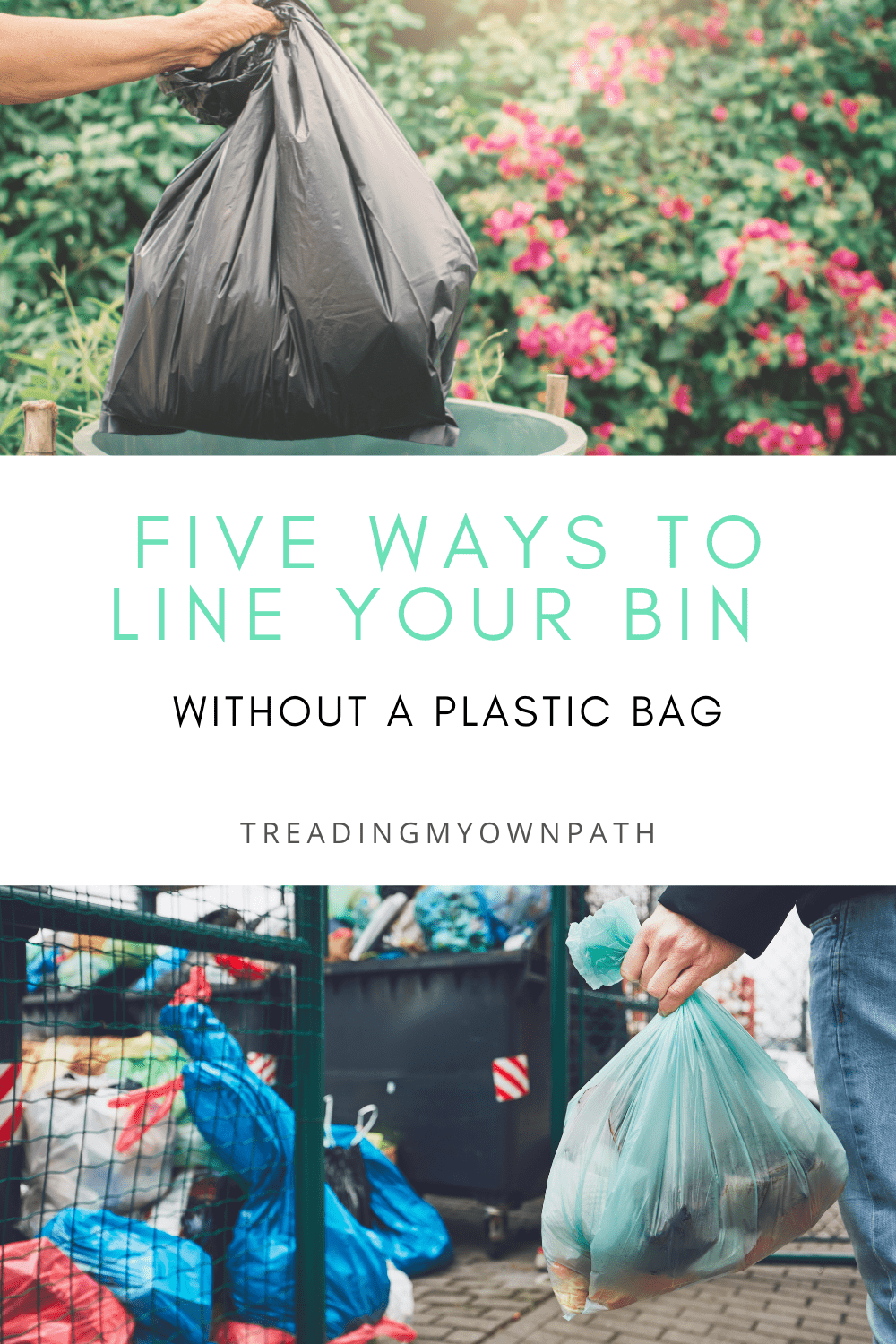
How To Line a Rubbish Bin Without a Plastic Bag
1. Use No Liner At All
This might not work for everybody, and it usually isn’t the first step, but have you considered not using a liner at all, and simply rinsing out the bin between uses?
The first question to ask is: what is actually going into my bin? Is there food scraps and stinky stuff? Or is it just dry, clean non-recyclables like plastic packaging and mixed-material products?
Typically the average household bin is made up of 40% food waste. That’s the wet, gross bit that makes our bin icky. If you can separate your food scraps and dispose of them separately, there might be no need for a bin liner.
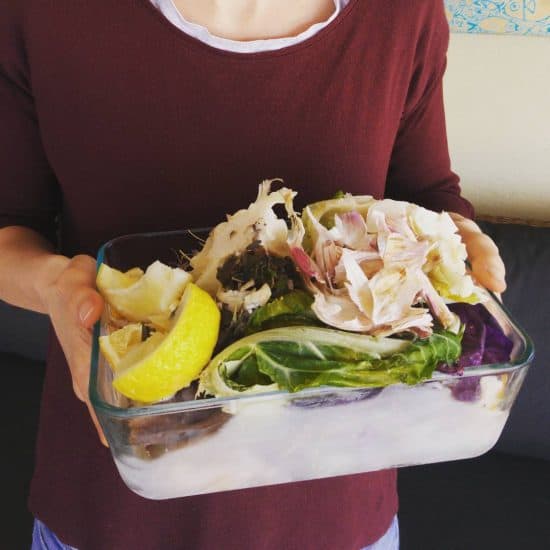
If you’re not ready to set up a compost bin, find out if there’s anyone in your area who already has, and who is willing to accept their neighbours (i.e. your) food scraps. There’s a free directory at sharewaste.com.
If you’d like to set up a worm farm (these are great for small spaces and can be kept on balconies or indoors) you can DIY your own with old polystyrene boxes or invest in a purpose-built version like the Hungry Bin.
If you already compost or worm farm, but still produce meat and fish products that you don’t want to compost, you can actually bokashi them (here’s some info about how bokashi bins work). The resulting fermented bokashi contents can go in the compost.
Whilst you’re getting a food waste recycling system set up – or if you just don’t have the energy for this at the moment – and you have space, consider using a large yoghurt tub with a lid / lidded bucket to collect food scraps and keep in the fridge or freezer until bin day, and empty these directly into the external bin.
2. Line Your Bin with Newspaper
When I first went plastic-free in 2012, I switched from using plastic bags to line my bin to using newspaper. I received a free community newspaper in the letterbox every week. If you don’t get the newspaper yourself, ask friends and family, neighbours, workplaces or cafes.
This is how I did it:
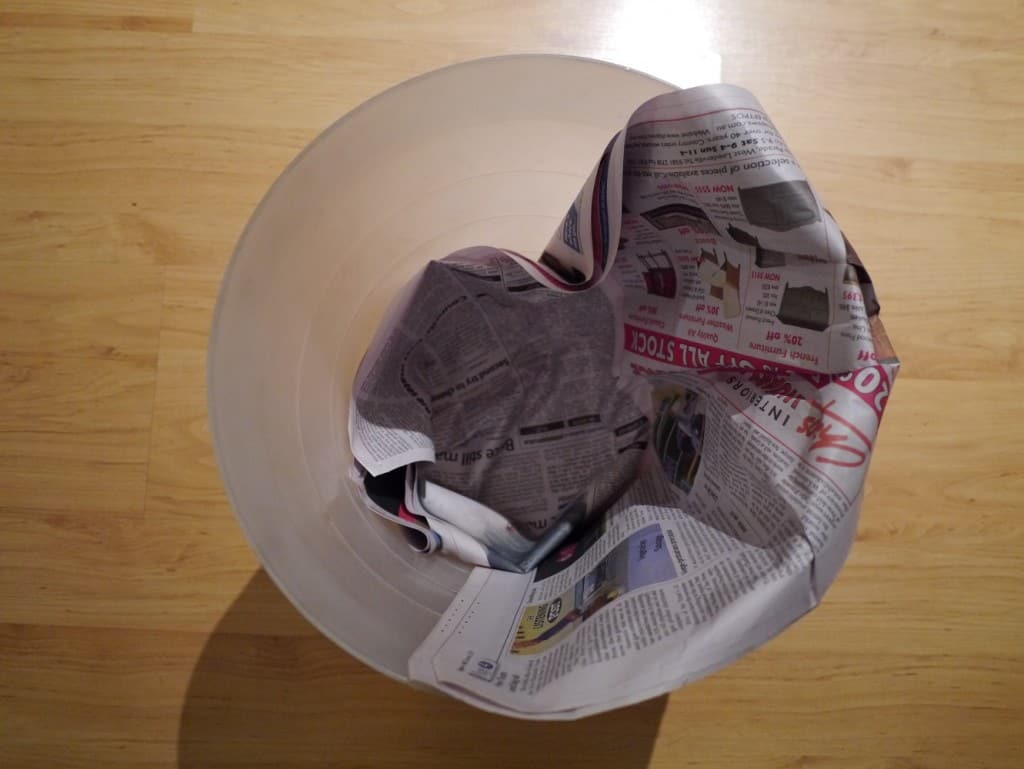
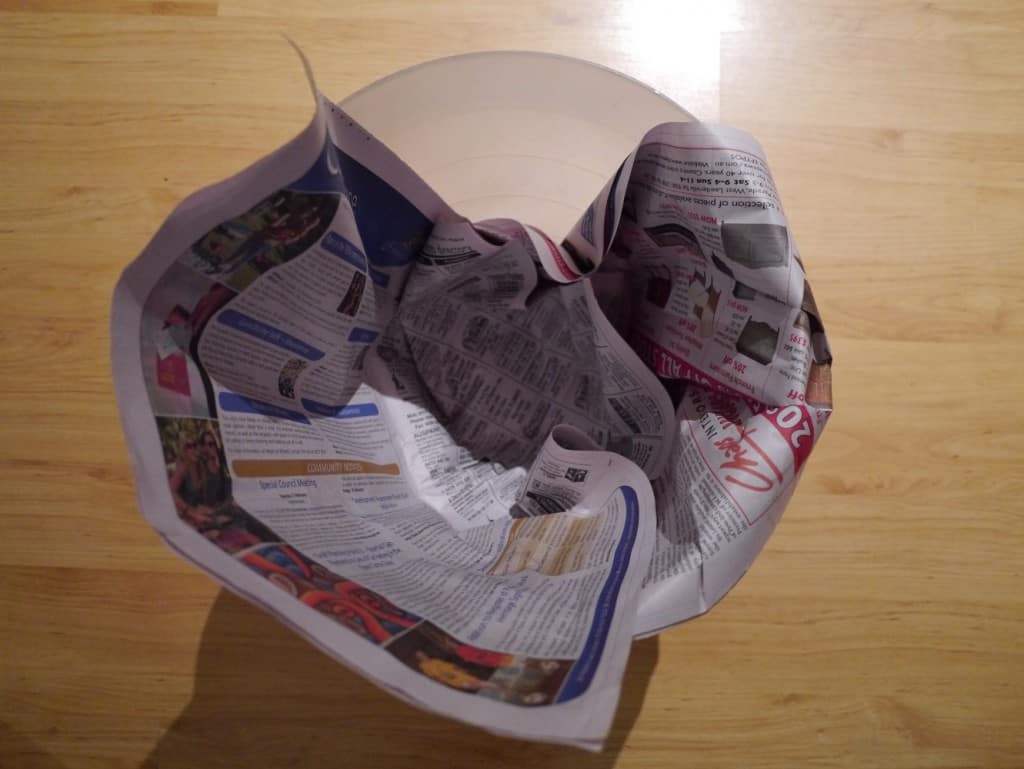
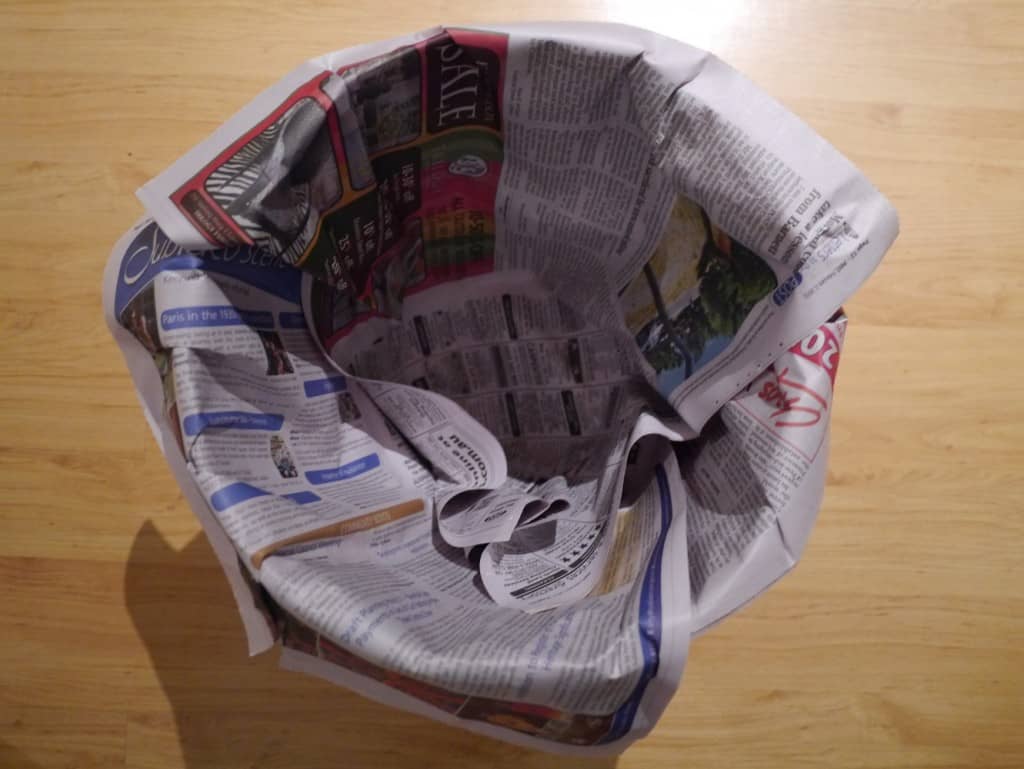
Using old newspaper means repurposing something already in existence, and no new plastic is consumed.
(This is how I started; next I focused on how to recycle my food waste to reduce the wet stuff, and then I went liner free.)
3. Line Your Bin with Other Repurposed Materials
If you have large paper bags, old cardboard boxes or other packaging, consider using these to line your bin (or to replace your bin). You might find it possible to empty the contents into an external bin and reuse the vessel again.
With all paper and cardboard, it is better to recycle than to compost, and to compost rather than to landfill. However, repurposing something that has already been used is better than buying something new.
4. Line Your Bin with Certified Compostable Bio-Based Bags
Something I often wonder about purchasing brand new bin liners: why would I buy something brand new with the sole purpose of putting it in the bin?
But I did it myself in the past, and we all start our journey somewhere. If you’re not ready to compost your food scraps, don’t think the newspaper method will work for you, and really want to use a purpose-designed liner, then certified compostable bio-based bags are worth considering as a transition step.
The labels “certified compostable” and “bio-based” are important. Plenty of products exist that say “eco friendly” and “green” but don’t (or can’t) back up their claims. If you want a better option than fossil-fuel based plastic, look for these two terms:
Bio-based means made from plants, not fossil fuels. Sometimes they are called plant-based, cornstarch or PLA. They are still plastic, but not made from fossil fuels.
Certified compostable means that the product has been tested and is proven to break down in hot composting conditions. Certified home compostable means the product will break down in a home compost bin.
To ensure the bags you pick are certified compostable, look for these logos:

However, certified compostable does not mean they will break down in the environment, or in landfills, and no compostable plastic has been shown to break down in the marine environment. They are just as capable of creating litter and harming wildlife as regular bags. As with all single-use items, they use a lot of resources to manufacture versus their useful life. Their main advantage is that they reduce our dependence on fossil fuels.
Avoid oxo-degradable and oxo-biodegradable bags, as these are plastic bags made with fossil fuels that have an additive which means they break down more quickly than regular plastic bags – into microplastic. These are considered by many to be worse for the environment than regular plastic bags.
5. Line Your Bin with Recycled Plastic Bin Liners
If you really need to use plastic, then consider using recycled plastic. The higher the recycled content, the better.
There is so much plastic already in the world, and only 10% of it has ever been recycled. The more we can do to re-use what exists, and stop producing new plastic, the lower the environmental burden will be.
Plastic bags were only actually invented in the 1960s. We managed before, and we can manage again.
Now I’d love to hear from you! What do you use to line your bin, and how has that changed along the years? Do you have any other tips to add? Or another challenge you’d like some tips dealing with? Please share your thoughts in the comments below!
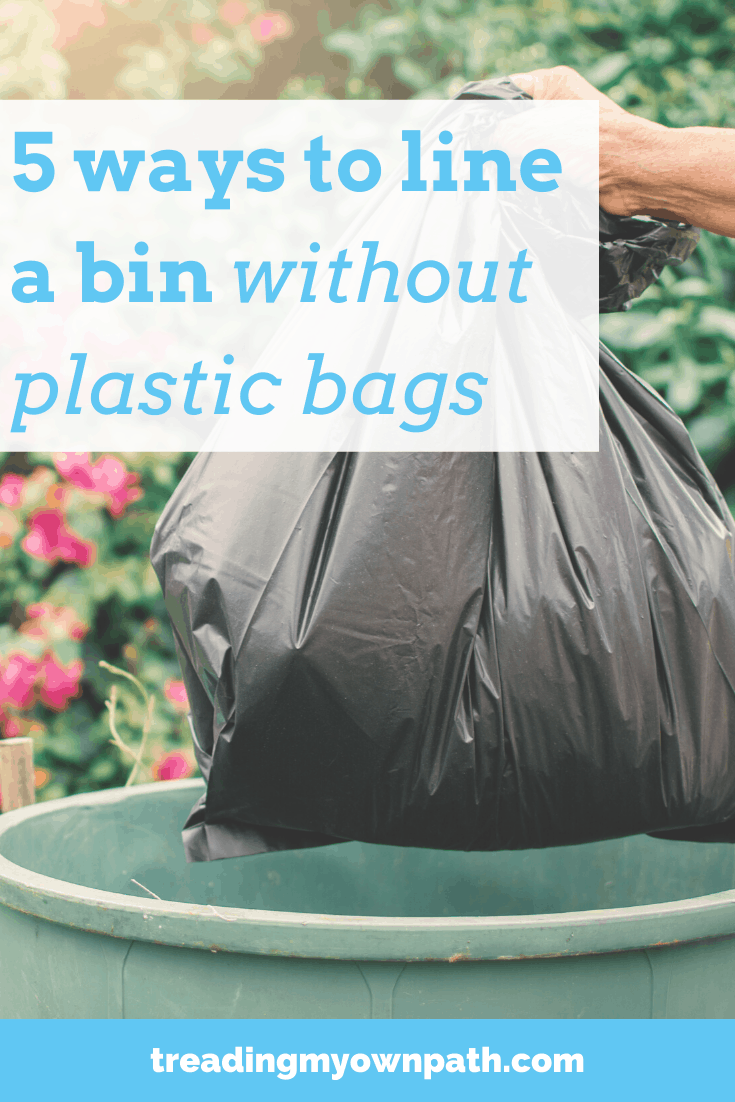
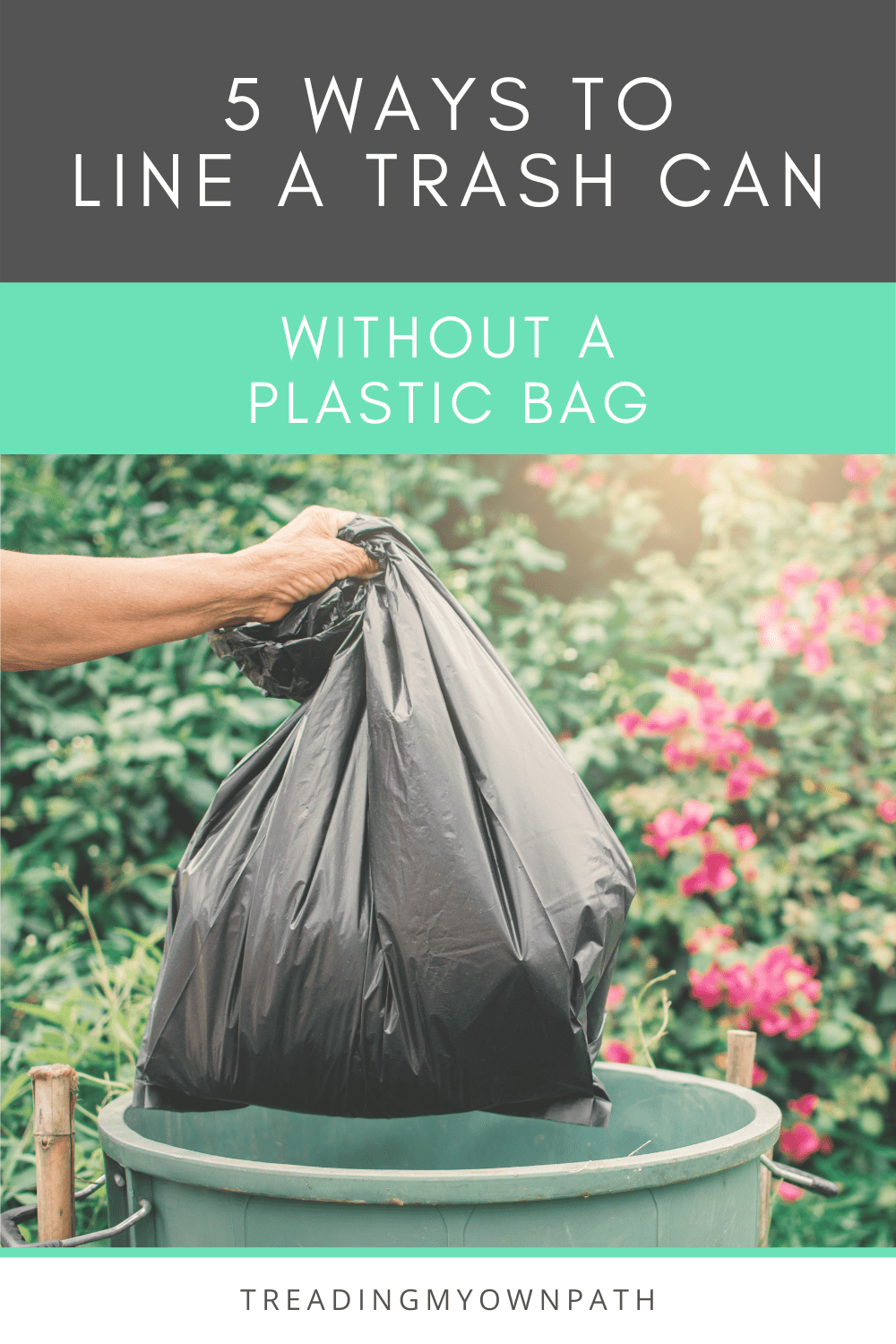
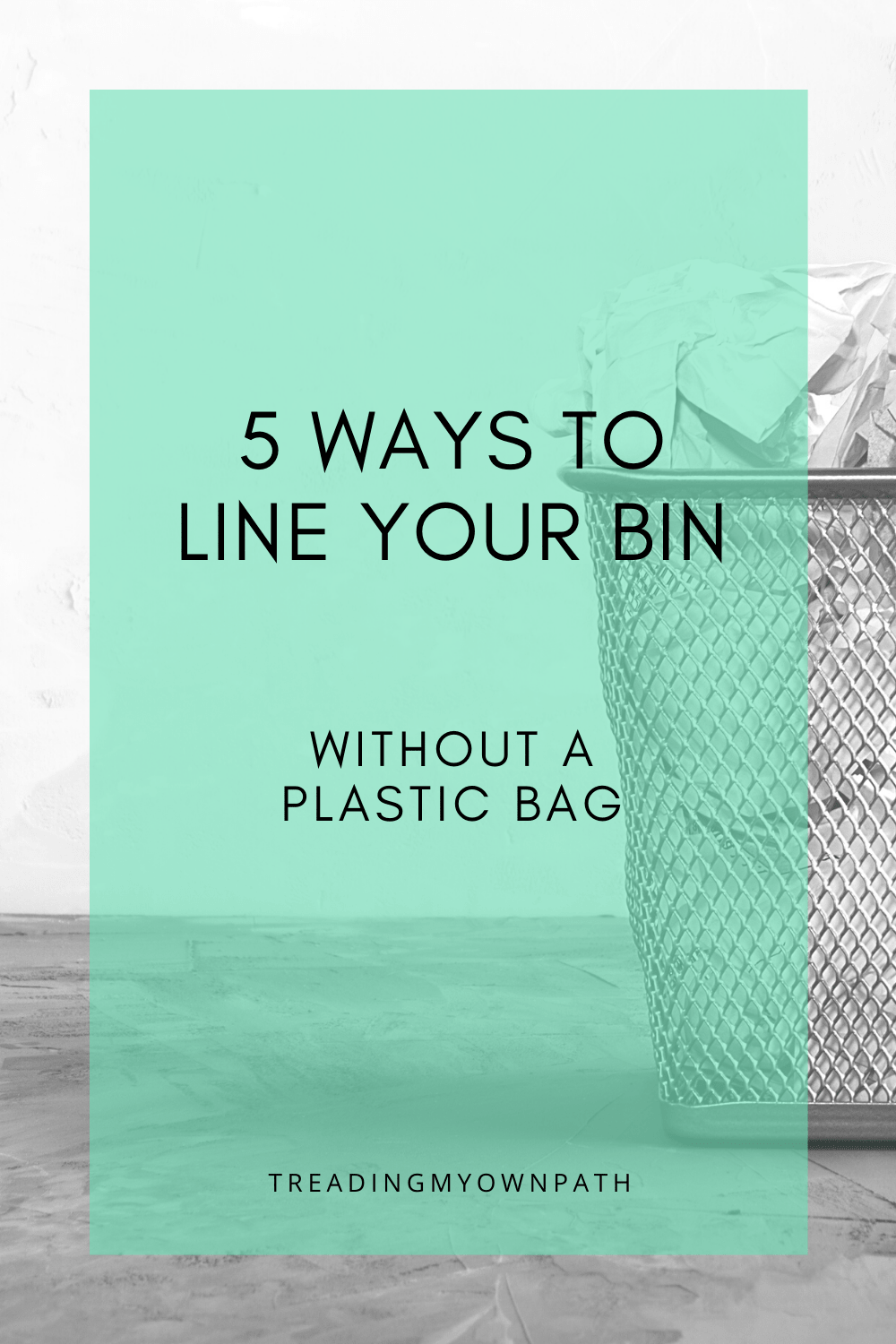
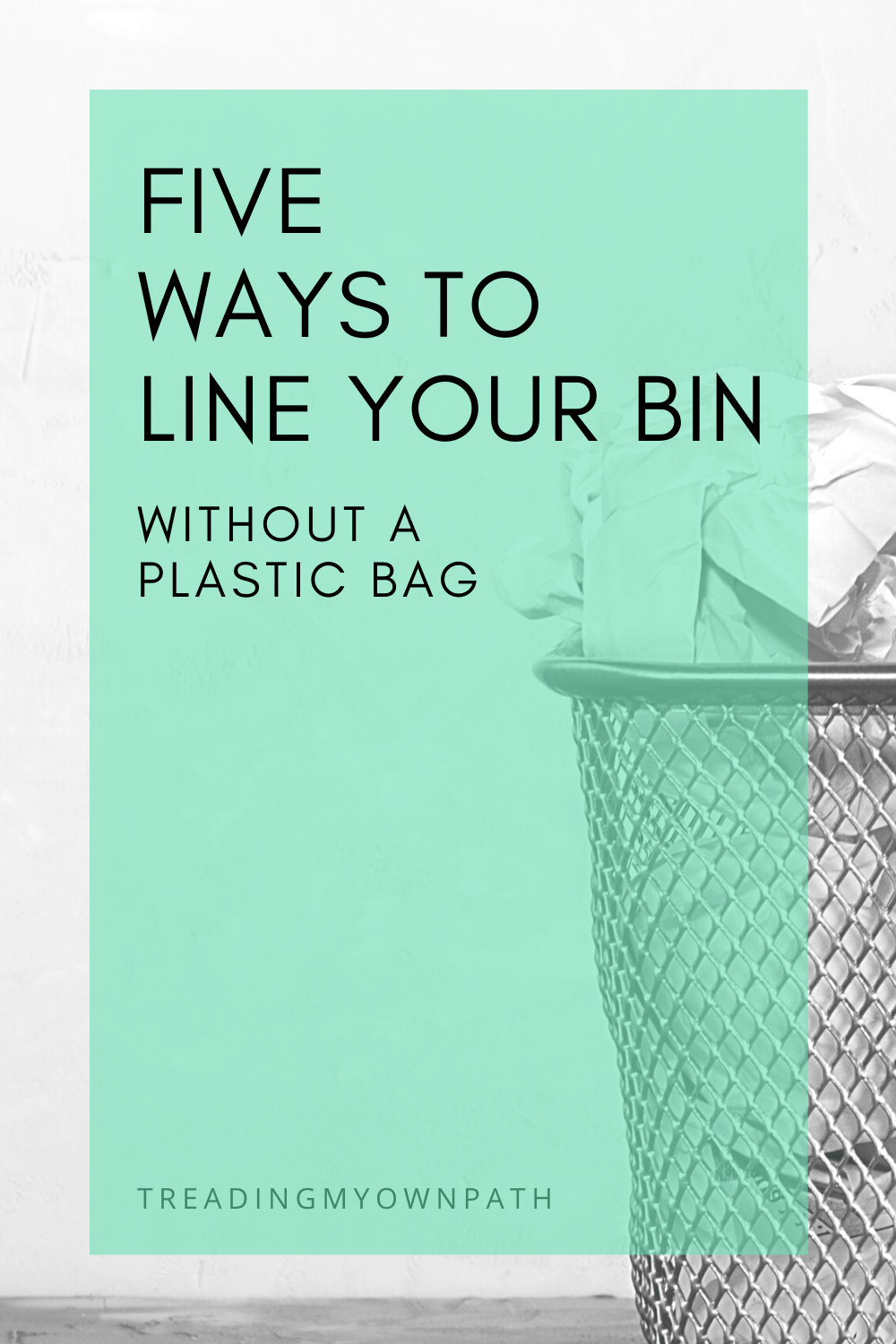

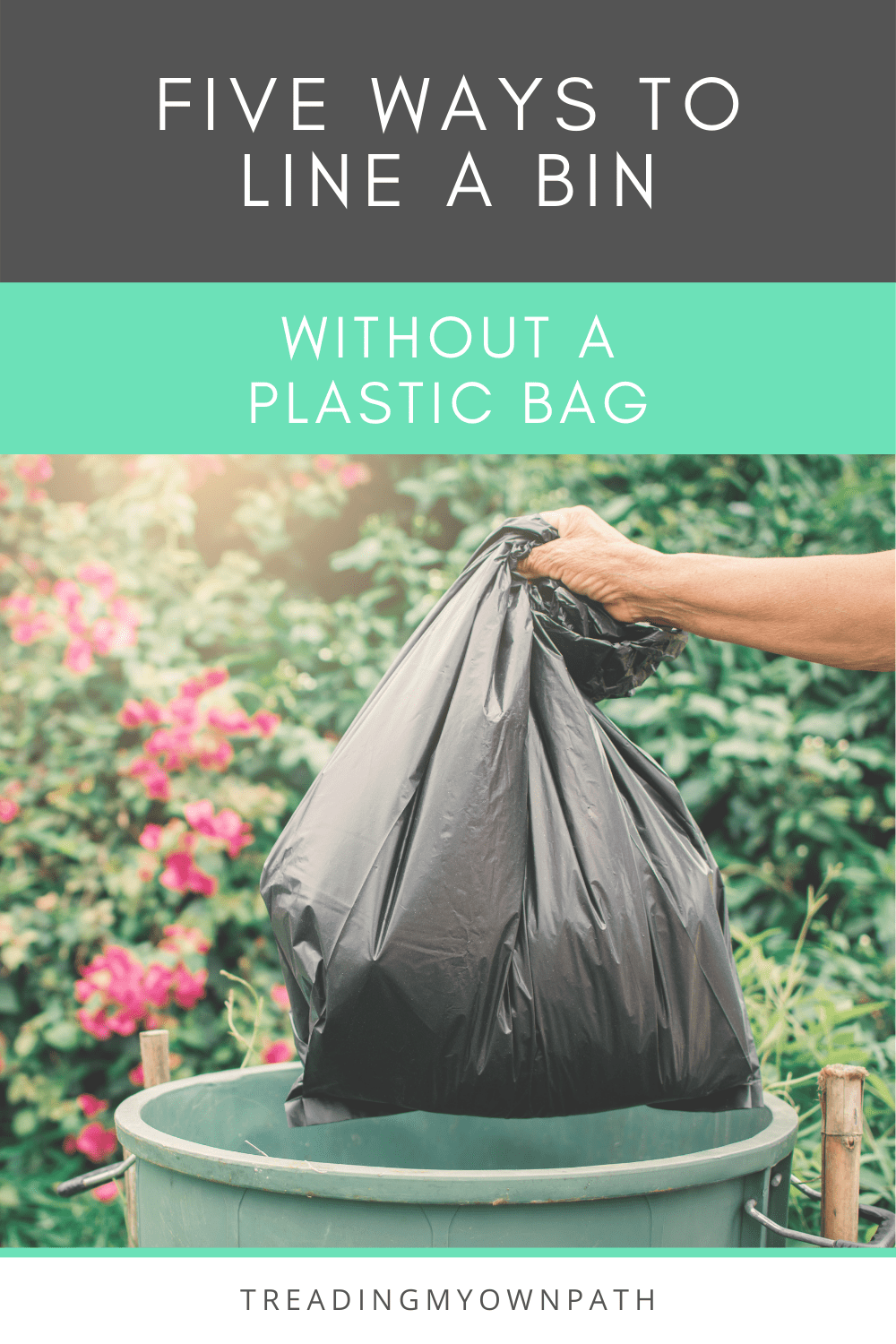

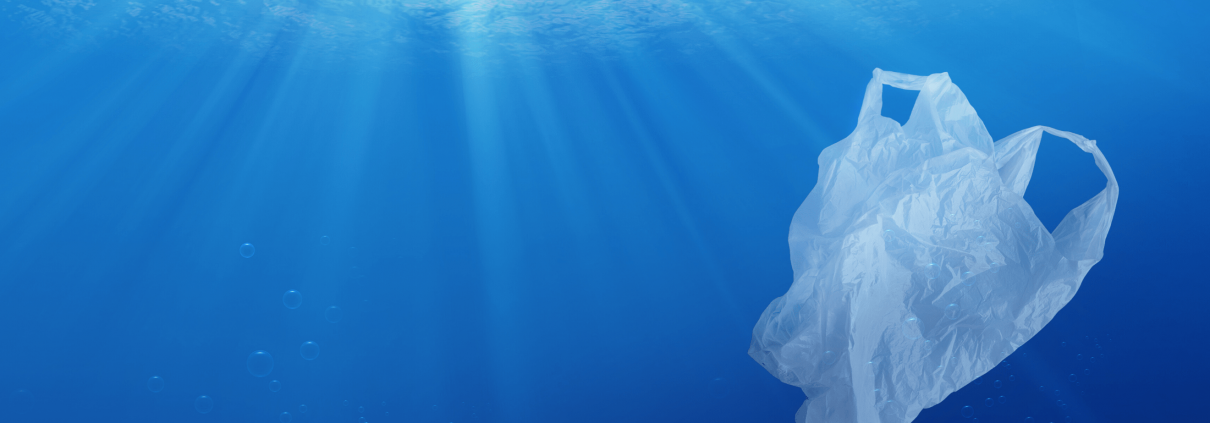
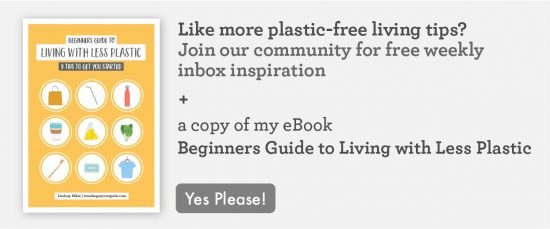




I use paper shopping bags for preference, fruit shop paper bags in the smaller bins. These are easy to come by. Often I line my bin bag with extra paper in case wet scraps get in. These are usually meat scraps which I keep out of the compost. I would like to be able to buy strong paper bags for this purpose. Maybe I will search online.
Ooh! I have just bought 50 medium paper shopping bags with paper twist handles from Queensland Industrial Supplies. I like the twist handles so I can cut and tie them. They cost me $26.
Sorry. $27. $30 with postage.
Trouble is you’re not helping-trees have to be cut down to make paper so you’re creating another problem-we need to save all our trees and more☺
you can save more trees by not eating beef .. but doing both would be ideal
where are you that your cows eat trees?
The rain forests are being cut down to make room for grazing cattle. Don’t be ignorant.
Stop with the insults. Don’t be mean.
A farmer school friend made a Kurrajong tree leaf elevated pruner run by a tractor for feeding the sheep on near-desert land.
Right!!!!
Trees will grow, I do not use paper napkins or paper towels, No plastic is certainly more environmentally preferable than anything.
No matter how much trees you plant, the atmosphere still won’t be as healthy as last time
Paper shopping bags are definitely an alternative to plastic bags and a good first step! If you can find paper bags with recycled content, and/or if you are able to use them for other things first before using them to line the bin then even better :) (I say this because the energy footprint of paper bags is quite high – 3x that of a plastic bag. But of course you never see a paper bag stuck in a tree or strangling a sea creature. So paper beats plastic on the pollution front, but the more reuses it can get the better. )
I wrap meat scraps in a few layers of thick newspaper and then put them directly in the outside bin
a friend merely digs meat scraps into the garden – he has a trench ready made and uses a bit of it every night. Improves the soil too (eventually)
Nothing like a bit of fresh air after dinner
A very timely article as we have been talking about not using plastic bin liners. We already compost, and meat scraps go to the chooks, so we were considering using nothing as a trial.
chooks are soo useful- the only meat scraps that get thrown in the bin areif we cook (purchased free range organic) chicken
I wish I had space for them! If you wanted to reduce your waste further, have you considered using a bokashi bin for the meat waste? You can read more about them here: https://treadingmyownpath.com/2015/02/19/bokashi-bins-the-whats-hows-and-whys/ :)
Another option with meat scraps, is wrap in newspaper and put in the freezer until bin day.
This is what I have done for 2years now…
Thanks Darren – and I think if you’re composting food scraps and feeding your chooks you can definitely go with no bin liner! Next step for you right there ;)
Welcome back!. How was the trip? Was waste free /low waste travelling do-able? Hope you had a fantastic time.
Thanks Ali! Trip was great, but one of those things you appreciate so much more once you’ve finished and can look back – it is definitely a challenge! Was waste free doable… is a different question to was I waste free ;) I think it is, but I definitely made waste. Something I plan to write about in the coming weeks!
It took about 5 months of ‘aspiring’ to zero waste before we ditched bin liners altogether late last year. I did find a YouTube video about folding newspapers a special way as bin liners but couldn’t replicate it :-) Doesn’t matter now though – I just wish we had thought about all this years ago! Thanks for the post Lindsay and hope you had a lovely trip!
Hurrah, no bin liners! Great job Kylie. I’ve seen a few demos of the fancy folding method (or at least a version of it) but stuffing it in works just fine for me! ;) My pleasure Kylie and thanks, yes I did!
Alas, my local authority will not collect waste that is not in a plastic bin bag. Very frustrating.
Ah, my brother had this issue in the suburb he lived in when he lived in London, Emily! Frustrating. My brother had a big colourless transparent bag to put all his landfill waste in (at least, that’s how I remember it). But at least all the stuff inside doesn’t need to be individually bagged. One bag is better than many bags, even if it is far from ideal!
Also consider collecting your veg scraps in the freezer to make your own stock. On a day when you’ll be home, dump the frozen scraps into a large pot, fill with water and cook for a couple of hours… easy!
Good thoughts Mary – I always save my onion peels and freeze to make stock. I tend not to peel other veggies, I just eat the peel. I don’t save kale stalks; I did try but the resulting stock tastes like garbage bins. So now they go in the worm farm :)
Such good timing! With plastic shopping bags set to go I was wondering how to do this – great info thank you!
Glad you found it helpful, Bianca! :)
Won’t it be a new world when one-use plastic bags become valuable museum pieces?! I have continued my mother’s long-time practice using paper grocery bags. I’d nearly run out, even with my low volume garbage; until the stores are again offering them. I have one for paper that gets recycled in bulk, so I bring that one back multiple times. (And sometimes I can fish more paper bags from the municipal bin.) And next to it is the landfill bag containing unrecyclables. That gets full so infrequently, my trash collectors sometimes neglect even checking my outdoor bin for weeks at a time.
And I’ll solicit compost materials from all sources for my gardens. I pass out sealable plastic coffee tubs to friends and family.
Haha Ruth, I don’t think they’ll ever be “valuable” museum pieces – sadly not finite or exclusive enough! But it will be great when they are the kind of thing we talk about and remember as a past thing that isn’t used any more. So long as there is no nostalgia!
Sounds like you’ve got a good system going. And of course I love the compost salvaging, great job!
Japan has recycled plastic in their Science Musuem in Osaka
Haha, wow! Thanks for sharing D!
How does everyone deal with kitty litter waste?
I use a hay based litter and put under trees as mulch (trees that don’t need weeding very often!). It is called Natty Cat, I think you can buy it online my local pet shop sells it
I use recycled paper kitty litter from Coles. I use newspaper for the poop and I chuck that and the rest of the litter straight in the big bin. I don’t see the need to put it in a plastic bag!
I began using brown paper lunch bags.
I’m told kitty litter repels possums – stinky. of course needs replacing after rain etc
We flush the cat poo down the toilet, then take the wet ‘clumps’ outside and either put in the compost bin or in the garden – although the pack says the litter is ‘flushable’, I asked our local water retailer and they said do NOT flush any cat litter down the toilet but ok just to flush the cat poo.
Interesting thoughts on the cat litter topic – thanks for sharing your experiences Sally May, Renee, Melissa, Geraldine and Kylie :) I’m just going to add to this Cris: I don’t have cats but I know people who do and use either the bentonite clay (clumping) kitty litter, or the newspaper pellet litter, and either compost or spread it on their garden as is (depends on the size of your garden – they spread under fruit trees).
Some people advise against composting cat faeces as it can contain a parasite that is harmful to humans. The people I know who do it have been doing so for years without issue, but it’s something other people may be concerned about. I’ve also heard that some water treatment companies say don’t put it down the toilet – so I’d check what your local facility says (I assume it depends on how they treat it and what they do with it after).
I use newspaper :)
Ah, the “classic” approach, Liz! ;)
Hi! I use compostable bio-“plastic” liners. I think it’s important to line the bin with something I can close/ tie shut, because loose garbage is just another flyaway risk in the whole garbage processing line. I’d think that goes for most countries!? And in Norway the treatment plants rely on optics to sort the different bags. Green for compost (goes to the production of bio gas for energy), blue for plastic to recycling and then the regular plastic bag from the shop for the rest. Paper and cardboard, glass and metals etc goes in a different system of course. So if we do the no liner or newspaper liner we actually mess opp the sorting process. Then here in Svalbard it all goes together because they don’t have space to sort everything at the plant
Hi Margaret, thanks for sharing this. I always find it so interesting how other countries deal with their waste. Here in Perth we usually have two flip-top green 240 litre bins: one for landfill and one for recycling. And the recycling is expected to be loose, if it is in plastic bags it gets diverted to landfill. So we are used to putting recycables in the bin loose. What you say is interesting though, because after the truck visits there are always loose plastic bottles and cans in the road!
The other day, I simply tied a knot at the end of my dry cleaning clear plastic bag (the end where the hanger sticks out) and used it as a garbage bag. Works well!
Re-use always comes above buying new in my book Andrew – although I do wish dry cleaners didn’t give out those plastic bags in the first place!
Yes! I hand it back to them to reuse (same wig hangers ) :)
**with
Great ideas. There is another organization called the Composter Manufactering Alliance (CMA). They test compostable plastics in real world comercial composting operations. Not every composting process and environment is the same. The compostable plastics don’t always break down the way we expect them to in every type of operation.
Oooh Scott, I find all this science-y stuff around composting super interesting! I’m personally not a fan of compostable plastics, and think that the public’s perception of them is that they are far better / safer / more compostable then they actually are. But I do think they are a good stepping point for people who really want a bag type solution. Interested to look into what these guys do so thanks for sharing!
What I can’t avoid are plastic sleeves from magazines we subscribe to. (And the magazine sections of weekend newspapers.) So I cut these off carefully and keep them near my waste bucket under the sink. I attach each new one to one side of the bucket by two clips, and most of what goes into this are small unrecyclable items such as cat-food pouches, and wrappings off groceries. After a few days I tie up this small parcel and pop it in the outside bin. Everything else is put in the recycling bins or is composted. Permaculture magazine, and now the National Trust mag, are now biodegradable – even better.
hi; I take mine to Coles for soft plastic recycling program; I’m a suburban girl so I have that opportunity
I was just talking about those plastic magazine sleeves with someone yesterday, Val! My insurance company sends me their magazine every quarter, which comes in a plastic bag. I’m not interested in the magazine, but I’m not sure how to cancel it either… I take this plastic to the soft plastic recycling at Coles, but if you can find another use for it, even better!
And yes, it is completely possible to get magazines in other materials. The PIP permaculture magazine is sent out in a recycled paper envelope. It’s that simple!
I used to get a couple of free magazines in the mail in those clear plastic slips. I wasn’t happy receiving this sneaky, avoidable plastic waste, so I called the organisations and told them to unsubscribe me because I didn’t want to receive them in plastic wrap. I suppose if enough people do that, they’ll switch back to paper envelopes. Here’s hoping!
You can reduce the size of your bin to match your intentions regarding waste. My goal is a zero waste household and I have currently reduced my kitchen bin from 20 Litres to 3 litres, so it reminds us of our goal. it is small enough to line with old bread bags or paper bags which are used as long as possible. (The contents are tipped into the bigger bins) Any single use non-recylable packaging goes back to the supermarket where it came from with a letter to the store manager asking them to address the issue. It’s work in progress!
hi; I take mine to Coles for soft plastic recycling program; I’m a suburban girl so hav ethat opportunity
Love it Diana! Of course it’s a journey, and we all start somewhere, but a great way to not have to deal with lining the bin is to not create any waste to go in the bin :)
hi, single; very little waste after compost, etc; use sm plastic tray with newspaper liner, when necessary tip onto sheet of newspaper (Mum buys the paper, and gives it to me); paper is secured with rubber band cut from old rubber gloves; placed in bin for collection. approx 5-700 gm per month I guess
Thanks for sharing Geraldine! :)
my plastic free journey makes me question many things that I use, my current question is around the cat litter that my 2 indoor cats use. I change this daily by emptying into a bag, all be biodegradable but does anyone else have any ideas on cat litter disposal? thanks.
Hi Helen! Some cat litter comes in paper sacks (I’ve seen the clay and newspaper pellet types sold this way), and you can use the empty sack as the “bin liner” for the used litter. If you use the newspaper type you could consider composting it at home – this is a whole other topic, but is an option…
Cat litter is a tough one. We tried training the cats to use our (second) toilet. One of them freaked out so we gave up. I’ve recently read that it shouldn’t be flushed because the sewerage processing can’t destroy toxoplasmosis. It shouldn’t be added to compost where there is any chance it will be used on fruit/veg beds. We’ve spent years trying to wean them onto a paper variety and get ‘protest poo’ all through the bathroom.
Cat litter is certainly bringing up issues for people. Liz! I didn’t know “protest poo” was a thing – not sure I wanted to know! There’s been a bit of a debate in the comments above so I won’t repeat myself, but I do appreciate you sharing your experiences :)
I find this technique works really really.
I keep a newspaper handy in a kitchen draw. Whenever I have some messy waste I merely grab a few sheets of newspaper and wrap the waste into it then put it in the unlined bin. Because I wrap waste as I go I don’t need to line my bin. If the waste is particularly wet I use a glossy magazine, then newspaper, this generally stops the moisture from leaking out and into the bin. It’s not that hard, although I’ll admit most of my food waste goes into my compost bin.
I love it Steven – I love that you have a system that works for you and especially that you are composting! :) If everyone dealt with their food scraps, we wouldn’t need the bin liners, and our landfill would reduce by around 40%.
Hi Lindsay, thanks for your email. We have been discussing this as the supermarkets are ceasing using plastic bags. What will we line our bin with? We don’t buys newspapers, we read news online. We thought we might use a bucket as our bin, with no liner, give it a rinse out after emptying it, through that water on the garden and let it dry outside overnight, before use again the next day. Anyway thanks again.
Melissa I think that would be perfect! If you just have a small bin that you empty and rinse you’re not leaving anything in there long enough for it to fester and make a difficult cleaning job. I hope you’ve got your system in place and that it is working! :)
I’m considering making some binliners from repurposed washable fabric. We already compost and have wheelie bins for green, recycling and landfill that the local council provide so most of my landfill waste is non-recyclable food wrappers. If I used a tightly woven fabric, like a canvas or something I think this could work. If it was stiff enough and well designed, it might even stand up on its own.
Hi Gina, someone on my Facebook page told me that they use jute bags and rinse them out. Personally I’d prefer something that could go in the washing machine but I think this is a great idea – do let me know if you give it a go and how you find it! :)
Hi. I live in (old) South Wales UK. My county in Wales is pretty on the ball on recycling. We have a weekly food waste collection and are provided with a kitchen caddy, compostable bin liners and a bigger green bin to decant it into to. Plus a large blue box with a lid for paper and card; an aqua box for glass; a red box with a net lid for plastic, foil and metal which are also collected weekly ( I only put mine out about once a month) a black wheelie bin for all unrecyclable waste which is colected once a month. Tetra packs have to be taken to the local “dump”. I collect them up and take them when I’m passing. I’m surprised you don’t have a food waste collection. We also have a Homemakers warehouse that takes old furniture etc for resale.
I know that recycling is NOT the answer (Refuse and Reduce IS) but at least if everyone made a proper job of it a lot less plastic would get into the ocean.
Hi Sue! When I lived in Bristol back in 2011 we had a compost collection service but here in Perth in 2018 we do not. One council is currently doing a trial and I’ve heard that it went very well, so maybe it will come. My council actually composts the entire rubbish bin – and you can imagine how much contamination is in there when everyone’s bins are mixed together?!
The thing about Europe is there are a lot of people and consequently a lot of markets to sell things on. Here we don’t have that, which is why our recycling is so dismal. Yet so is our reuse…which is a tragedy!
Here in Ballarat Australlia the big supermarket chains (Woolworths and Coles) have finally gone single use plastic bag free. Yay. Next step is for all stores to stop printing so many catalogues.
Don’t get me started on those catalogues, Brit! Alternative next step: sticker the entire neighbourhood’s post boxes with “no advertising material accepted” stickers! ;)
Hi
I’ve bought compostable bio liners for the large kitchen bin, which goes into the black wheelie bin. We don’t have newspapers, bought or free. There’s also a good recycling system in our UK County area, we have a blue wheelie bin for cardboard, glass, cartons etc… green for garden waste and the black one for unrecyclable waste.
I’m working on reducing our plastic use this month.
Sounds like you have your bin system in good order, Sharon! Reducing plastic is definitely the next obvious step. Good luck and if you have any questions be sure to ask – I’m here to help! :)
We have two elderly indoor cats and use the bennoite clumping clay kitty litter (cos the paper one just doesn’t capture the smell). Cutrently We scoop the doos and clay clumps into paper (‘glossy’ junk mail under that and wrap it up. Goes into the bin as is. At a previous house I had a doggy dooley system. Wanting to do that again for the poos. We have compost worm farms and will soon have a compost toilet but pet poos are even more dangerous than ours so these need special treatment and to be kept away from soil surface runoff.
The doggy dooley Is basically a miniature septic system (involves digging a hole about 1m deep in yard) for your pets waste that you add water and biological activator to to break down pet poo. (Keeps it out of reach of vege garden roots only trees access that deep). Takes a bitbif muscle to get started but lasts for years and works very well.
Have started using the bulk kitty litter bags as kitchen bin liners. And all soft plastic wrappers including mag wraps and glad wrap from newspaper delivery gets washed, dried and returned to coles/woolies. We have just started a bee hive so am now collecting the cat food tins (washed) to make into beeswax tea lights in.
Hi Carolyn and thanks so much for sharing! I have a dog poo worm farm at home, and it’s great. Sounds like you’ve got some systems in place too. It just takes a little time to set these things up and then it is as easy as anything.
Sounds like you’re being very resourceful, I love it! :)
Hi there! I”m Wondering if you have any ideas for a plastic free hotel! my partner is a cleaner and manager at a resort that goes through a ton of bin liners. Guests expect bins to be lined with plastic bags (although I wish that everyone would get the expectation out of their heads of plastic being the only way to keep a bin clean). Just wondering if you had any ideas, I’m thinking the bio bags would really be the only option? Any information would be helpful! Thank you!
Hi Katie, that is an interesting question! And a good one. One thing that always frustrates me about hotels is the lack of recycling. Why is there only one bin? Why can’t there be an unlined, wastepaper-style bin for dry recycables only? I worked somewhere once where they emptied the bins into a bigger bin, but only replaced the liners if they were soiled. I’m guessing a hotel wouldn’t like this option though… I guess the first thing would be to figure out what guests would find acceptable and unacceptable, and work backwards from there…
Thank you for sharing this. Bit by bit we are going along this path and rethinking our choices. Thank you for being a trailblazer!
My pleasure Ali, glad you found it helpful :)
I am a new greenie. Some trees do need to be cut. Such as Ash bore and other reasons. Age, danger of falling on homes, etc. The new technology at the stores that gives you a mile long paper receipt? Did that help the trees? However, my problem is recycling bins being dumped at curb on windy days. It blows everywhere. I would like Tall paper, able to tie, for our City recycling program. Our 2.6 ac fish pond is full of plastic garbage. Where to find this bag item? Tree City, Wisconsin
I live in an apartment block in an inner city area – not much use for compost! And a shared bin on each floor – would be so inconsiderate of neighbours to dump waste that isn’t securely wrapped cos of smell and flies. How do we deal with this as a community?
It seems that very essential and informative ideas are here. I really love the way you explain the procedure of using bin without using plastic bags. Thanks a lot for sharing!!
I have done without a bin liner for a few years now!
After I’ve rinsed it out and while it’s still damp I sprinkle it with bicarbonate soda or the likes
This gives the bin a little dusting all over and keeps smells at bay
you can buy whats called a bulk bag they use for feed etc, which holds much wait! and keep it in your city trash can with band around it the big handles helps with that, they have big handles for the fork lifts to carry feed with, works great and never by a bag again, plus it rinses off well.
Hi C, thanks for the tip! Great idea. I know a few people use sacks from dog food or kitty litter which are probably similar :) Reuse is always better.
Hello, Thank for your idea in your article, and may be some people can considering using a reusable bag. I’ve hobby I’m sewing, so I sew a bag (this is exactly fit my bin) in PUL (polyurethane laminate) that is fabric with fine polyurethane film on it, so is washable and don’t leak if some wet waste go in it. For me that is better of washing bin directly because my health condition (fibromyalgia) give me pain for washing extra sized items (like 50l. bin). So every 10days I put this bag in my washing machine for odour less bin.
And please excuse me for bad English, i’m French and I learn English actually but that take time for improve my English.
Hi Layana, thanks for your comment! Making your own liner is a great idea :) I love sewing projects that are practical! Also, your English is great!
Well, maybe I’ll try not lining my bin (we call them trash cans in U.S.). I already put food scraps in a small bucket under the sink lined with a “bio bag”. I live in a condo and we have a compactor, but I do have concerns about fly-away stuff. I’m about to join to a composting organization that will pick up every week or two. They provide a closed container. Only vegetables, no meat scraps. As I live alone it will be interesting to see if I generate enough in two weeks to make it worthwhile. I enjoyed reading all the different posts. I definitely have newspaper I could use to line the bin. Hmmmmm. Food for thought.
Oh this sounds great Karen, a composting organisation! Do give me an update of how it goes!
https://www.javascompost.com this is happening in New Jersey.
I very much enjoyed reading everyone’s comments on how they reuse. And im glad i’ve found this page. I am currently researching products myself pertaining to the “reuse” factor to save costs within the household. I have patented the idea of using a silicone liner for bio-waste or green waste as we call it, potentially removing the need for waste/garbage bags in their entirety. Therefore it’s an easy rinse each time you empty your bin and it cuts back on the smell and mold build up depending on your house hold needs. I’m curious with everyone’s feedback on this new potential product. Any one care to share?
Thanks for your suggestions. I definitely agree cutting out organic waste is important and cutting back as much as possible generally.
My only concern the ‘no bin liner’ option is that the rubbish is free to float around and can fly out when the bins are collected. I tried going without a bin liner once and after my wheely bin was collected I found rubbished strewn along the road – mostly light plastics but also some larger bits – I only put non-biodegradable items in the bin, so all would have been bad in the environment and I had to spend ages picking it all up. I have actually driven behind a rubbish truck that had lots of bits of plastic blowing out the top.
I always use a bin liner now (either a re-purposed plastic packaging item, or paper). Not ideal, but I think it is better for the rubbish to make it to the tip and be securely buried then saving one bag but having all your plastic strew out in the environment making its way into the waterways and ocean.
Obviously also depend on the type of rubbish collection system you have or if you take it to the tip yourself. I would love to be zero waste and not have to worry about it at all but I haven’t quite made it yet. I also have been wondering about rubbish compaction in home – that would potentially help prevent it floating about as well as reduce space and the amount of compaction needed to be done at the tip.
I used plastic bags, not a bin, the bag hung on hooks inside a cupboard door, then later on hooks behind the door (it’s a tiny kitchen).
Then the grocery bags were no longer available.
I realised that a lot of my rubbish is empty packets anyway, so the larger ones – from muesli, cat food, bread, cornflakes etc. are my rubbish bags. Now I hang one bag onto the back of the door with two fierce hardware clips and when it’s full I either twist and tie the top or put a piece of packing tape onto it and take it out to the wheelie bin. Occasionally when heavy the bag would slip from the clips but a small piece of cardboard include in the clip stops this.
Another bag hangs below the rubbish bag to hold the waiting empty bags.
Now that I have my daughter with her large family living nearby, there is a good additional supply of bread bags.
This is not quite as simple as a larger grocery bag with it’s two handles, nor as sleekly elegant as a designer bin with bought liners, but much more satisfying as the bag was already rubbish.
Vege scraps go to the compost and/or the worm farm.
I really like the newspaper idea. I get a local shopper paper EVERY week and I have opted out of it several times now and they always send it like clockwork.. So this is the perfect solution for me for all my newspaper!
Thanks for sharing!
-Dori
Can you ensure that these will not make it harder for the collectors to pick up trash that will spill?
Well it’s doing to depend on how your waste is collected, but in Australia where I live, we have large bins that are picked up by the trucks and emptied via a moving arm into the top of the trust. There is no human ‘collector’ handling the bag. Of course if your system where you live is different, you will need to think about what will work best in your circumstance :)
Thank you for sharing such valuable information.Northwest Eco Clean offers extraordinary residential and commercial garbage bins, trash bins and dumpster odor removalservices in the Renton area in Washington
Many people are struggling with the food with this huge inflation, and you are asking them to pay more for the paper bags for their food wastes. Not realistic.
I agree; this is what I’m trying to figure out. Since plastic bags were given out for free at the grocery store, how do I obtain liners for my small garbage buckets at no greater cost to myself once Canada’s single use plastic ban comes into effect? It’s great to ban them, but it will not be adopted if a same-cost alternative is not made available. My wife will not put up with ‘not lining the bin’, especially because some packages (i.e., meat trays) still need to go in the garbage and will create stink, and not eating meat is not an option, nor is buying it at an expensive deli that wraps it in paper, and we don’t get enough free newspapers anymore due to most of them going out of business. So, how do we line our small household bins without incurring expenses?
Thanks for posting this helpful blog and We are a Supreme Plastic Company whose that provide Plastic Dustbin Trash Can Manufacturer and you can buy Household Plastic Ware in Ghaziabad. Before More Information visit our website: http://www.supremeplastic.co